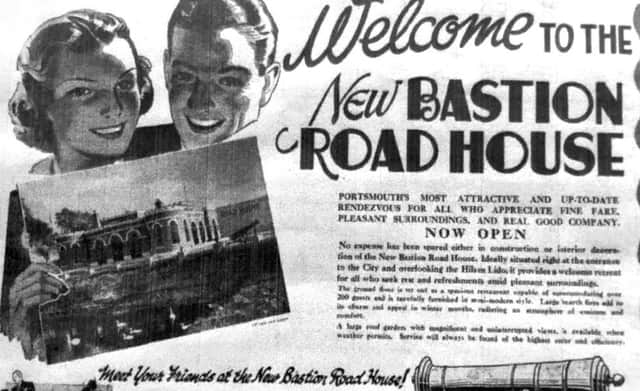Portsmouth classroom came with mice running around in an organ


It was a success from the opening day as it was just south of Portsbridge and perfect for picking up trade from Hilsea Lido across the road.
The Road House closed in 1956 or thereabouts and became a garage. It was demolished in the mid-1980s.
Advertisement
Hide AdAdvertisement
Hide AdI wonder what happened to the large cannon seen on the right of the photograph?
• It has been my privilege over the years of writing this column to have spoken to some marvellous people from all decades of the last century.
But few have surpassed 95-year-old Sheila Robinson, now of Portchester but formerly of Old Wymering Lane, Cosham.
So much passed between us it would take a month of Saturdays and some to relate everything she remembers with absolute clarity.
Advertisement
Hide AdAdvertisement
Hide AdThe photograph I published recently of the old church building, formerly a school, in High Street, Cosham, is remembered well.
Sheila attended the school for junior girls run by the Portsmouth Education Committee aged eight back in 1929. It once belonged to the Church of England.
The boys had it worse. They had to trek up the hill in east Cosham to some old run-down First World War army huts. The girls were regularly visited by the vicar of Wymering Church.
Sheila recalls the awful conditions children were taught in: ‘The building was in a terrible state of disrepair.
Advertisement
Hide AdAdvertisement
Hide Ad‘I sat next to the organ and could hear mice running about inside it. Classrooms were in the main body of the church and divided up with half-length curtains held up by rings along rails.
‘The noise from all the other ‘‘classrooms’’ was very loud and very distracting when trying to learn.’
Such were the times there was no heating in the church and in deep winter the teachers made up large canteen-sized jugs of cocoa for their pupils.
The roof was not all that sound either, Sheila told me. ‘My mother was a singer and on Monday evenings the choral union practiced. One night, all of a sudden a heavy window in the roof operated by rope pulleys gave way and crashed to the floor just missing the choir down below. It would have been fatal had it hit anyone.’
Advertisement
Hide AdAdvertisement
Hide AdAged 11, Sheila and her classmates moved from the former church to a new building called the Bungalow School on the slopes below Queen Alexandra Hospital.
‘We were in a daze to be honest,’ she says. ‘The smell of new painted woodwork and a glass sliding wall opening to the spacious lawns...
‘There was a grand opening ceremony with dignitaries attending.
‘We all sang What Shall We Do With the Drunken Sailor, an awful choice in my opinion, although we sang other songs.’
I shall include more of Sheila’s memories in coming weeks.
Advertisement
Hide AdAdvertisement
Hide Ad• Does anyone remember two or maybe more redundant steam locomotives which were stored in the siding between Havant and Warblington in 1967, the year steam finished on the southern division of British Railways?
Havant historian Ralph Cousins remembers the locomotives awaiting transfer to the west country and then to Wales where they would have been cut up. If anyone has a photograph, I’d love to see it.
• The photograph I published recently of the Essoldo cinema at Eastney brought back memories for Eddie Wallace from about 1929.
As a boy he lived in Eastney Road and was a patron of the cinema then called the Eastney Electric Theatre. He recalls being there when it showed silent films and a woman at the front playing a piano to accompany them. Silent films, remembered by someone still alive today. Amazing.